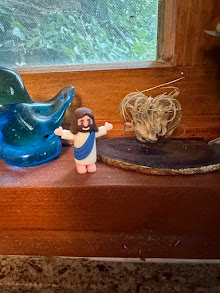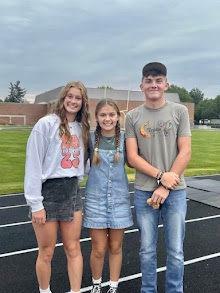Yet November can be a cruel month. More than twenty years ago, we stood around Grandma Eunice's casket in a fierce windblown rain. It rained three quarters of an inch that day, violent but brief, buffeting the tent and the family within. It was a drought year; we memorize our losses, weather included. Grandma would have appreciated the rain.
Just last week we mourned another grand lady. A pillar of the community, admired for her many contributions and talents, present and past. A woman of style and substance, she was blessed to be eulogized by people who knew her very well. Instead of a snow white dove, she was gathered 'cross the river on the wings of music, heartfelt, soulful, iconoclastic, God's most universal and unexplained blessing poured out on humankind. When we can't find words, we play..........
If you stay in one place long enough, you bury your ancestors, blood or cultural. You bury your Sunday school teachers, the ladies your mom played bridge with, the woman who "ran" 4H, the person who handed you library books, the Republican ladies, the Democratic ladies, the election judges, the doyennes of the garden club, the missionary ladies............
According to Herodotus, prince Cadmus brought the alphabet to the Greeks. In mythology, he slew the dragon guarding the spring of Ares. The goddess of wisdom, Athena, told him to sow the dragon's teeth and fierce warriors sprang from the ground. In small town life, our bringers of civilization bear no arms (unless a sharp tongue qualifies!), but they have always seemed to spring up straight from the ground like the dragon teeth warriors of old. Where are our Athenas for the future? Will we "look upon (their) like" again?
I don't intend to wax morbid or to imply a failure of community leadership or decomposition of the foundations of civilized society in the hinterlands. But a recurring theme popped up yet again this past week and there is no good way to answer this question: who will be the church ladies?
Who is going to make the fluff with mandarin oranges and nuts? Who will perpetuate golden glow salad? Who will mix pineapple, lime jello, cream cheese and Cool Whip? (I even had to look this one up!)Who will persist in mixing vegetables, shredded cheese, and orange jello? I still have the frozen cream cheese and cherry molded salad recipe from my mother, but I have never taken it to a church or funeral dinner. Nor do I prepare the cherry jello mold I adored when I was young. But the same women who brought multi-hued salads whipped into peaks with mystery fruits and nuts disguised amid the Miracle whip and marshmallows led every conceivable volunteer organization in our little town and most big towns outside the formerly male bastions of Lions and Kiwanis. One need not be a statistician to correlate the declining population of our cultural underpinnings with the reduced number of female produced and consumed fluff salads.
I don't know the answer. The women I know keep the balls of family, vocation, volunteerism, and homemaking in the air to an amazing extent. They do all this and keep up on Facebook too! We scale back where we must and double up where we dare. They fly...........by the seat of their pants when necessary. It isn't easy to be unselfish with time, our most limited resource.
As I wipe the syrup from the tables of our fellowship hall, or wander the kitchen looking for the right drawer for serving spoons, I will continue to admire the iron and lace, stocking clad standard bearers of our past even as I admit how far my efforts fall short. As they reap their heavenly reward, I'll raise my spoonful of Snickers salad and think of them partaking in..............ambrosia.
According to Herodotus, prince Cadmus brought the alphabet to the Greeks. In mythology, he slew the dragon guarding the spring of Ares. The goddess of wisdom, Athena, told him to sow the dragon's teeth and fierce warriors sprang from the ground. In small town life, our bringers of civilization bear no arms (unless a sharp tongue qualifies!), but they have always seemed to spring up straight from the ground like the dragon teeth warriors of old. Where are our Athenas for the future? Will we "look upon (their) like" again?
I don't intend to wax morbid or to imply a failure of community leadership or decomposition of the foundations of civilized society in the hinterlands. But a recurring theme popped up yet again this past week and there is no good way to answer this question: who will be the church ladies?
Who is going to make the fluff with mandarin oranges and nuts? Who will perpetuate golden glow salad? Who will mix pineapple, lime jello, cream cheese and Cool Whip? (I even had to look this one up!)Who will persist in mixing vegetables, shredded cheese, and orange jello? I still have the frozen cream cheese and cherry molded salad recipe from my mother, but I have never taken it to a church or funeral dinner. Nor do I prepare the cherry jello mold I adored when I was young. But the same women who brought multi-hued salads whipped into peaks with mystery fruits and nuts disguised amid the Miracle whip and marshmallows led every conceivable volunteer organization in our little town and most big towns outside the formerly male bastions of Lions and Kiwanis. One need not be a statistician to correlate the declining population of our cultural underpinnings with the reduced number of female produced and consumed fluff salads.
I don't know the answer. The women I know keep the balls of family, vocation, volunteerism, and homemaking in the air to an amazing extent. They do all this and keep up on Facebook too! We scale back where we must and double up where we dare. They fly...........by the seat of their pants when necessary. It isn't easy to be unselfish with time, our most limited resource.
As I wipe the syrup from the tables of our fellowship hall, or wander the kitchen looking for the right drawer for serving spoons, I will continue to admire the iron and lace, stocking clad standard bearers of our past even as I admit how far my efforts fall short. As they reap their heavenly reward, I'll raise my spoonful of Snickers salad and think of them partaking in..............ambrosia.





















